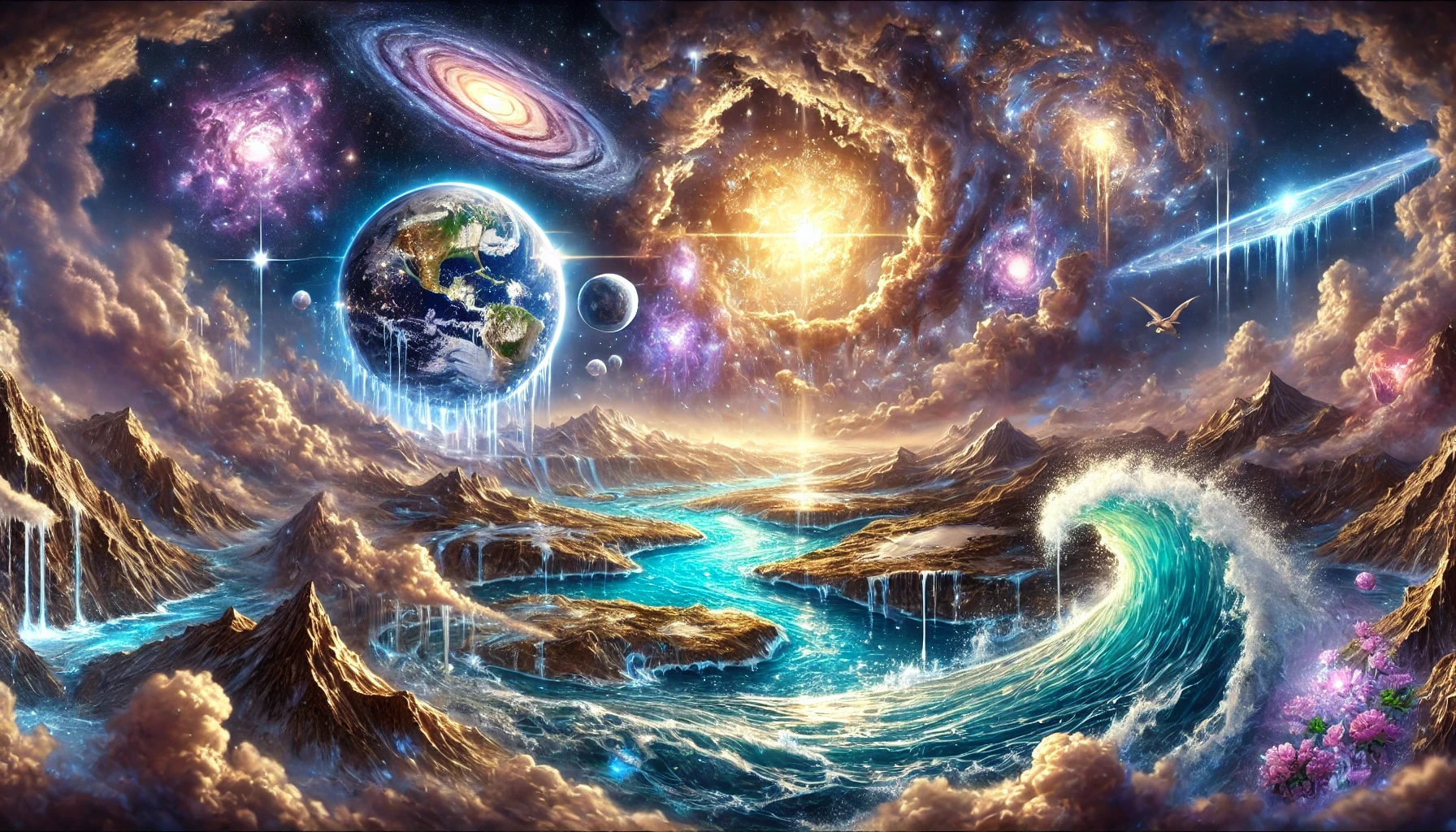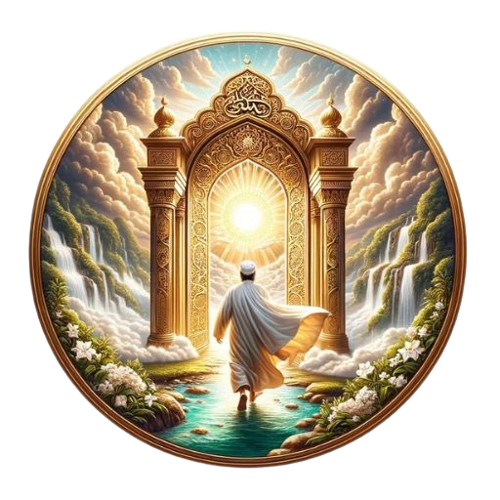The Concept of the Expanding Universe in the Quran
The Quran contains numerous verses that encourage believers to reflect on the creation of the heavens and the earth. One of the most profound and scientifically significant verses related to cosmology is found in Surah Adh-Dhariyat:
وَالسَّمَاءَ بَنَيْنَاهَا بِأَيْدٍ وَإِنَّا لَمُوسِعُونَ
“And the heaven We constructed with strength, and indeed, We are [its] expander.”
(Quran, 51:47)
Arabic: وَالسَّمَاءَ بَنَيْنَاهَا بِأَيْدٍ وَإِنَّا لَمُوسِعُونَ
Transliteration: “Wa assamaa banaynaha bi’aydin wa inna lamoosi’oon.”
This verse, revealed over 1,400 years ago, clearly mentions the expansion of the universe, a fact that was unknown to humanity at that time. The term “lamoosi’oon” (لَمُوسِعُونَ) is derived from the root word “was’a” (وَسَعَ) which means “to expand” or “to make wider.” This verse indicates that the universe is not static but is continuously expanding, a concept that aligns with modern cosmology.
Modern Scientific Discovery of the Expanding Universe
The idea of an expanding universe was first proposed in the early 20th century. In 1929, American astronomer Edwin Hubble observed that galaxies were moving away from each other, leading to the conclusion that the universe is expanding. This was a groundbreaking discovery that contradicted the previously held belief in a static universe.
Hubble’s observation was based on the redshift of light from distant galaxies, which indicated that they were moving away from us. The farther a galaxy is, the faster it is receding, which implies that space itself is expanding. This discovery laid the foundation for the Big Bang theory, which posits that the universe began from a singular point and has been expanding ever since.
The Quran’s mention of the expanding universe is particularly remarkable because it predates Hubble’s discovery by over a millennium. This correlation between the Quranic text and modern scientific findings is a strong indication of the divine origin of the Quran, as it contains knowledge that was beyond human comprehension at the time of its revelation.
The Universe in the Quran and Hadith

The Quran frequently mentions the creation of the heavens and the earth, urging believers to contemplate the signs of Allah in the universe. The Quranic description of the cosmos is consistent with the modern understanding of the universe’s structure and dynamics.
In addition to Surah Adh-Dhariyat, other verses also allude to the vastness of the universe:
أَوَلَمْ يَرَ الَّذِينَ كَفَرُوا أَنَّ السَّمَاوَاتِ وَالْأَرْضَ كَانَتَا رَتْقًا فَفَتَقْنَاهُمَا وَجَعَلْنَا مِنَ الْمَاءِ كُلَّ شَيْءٍ حَيٍّ ۖ أَفَلَا يُؤْمِنُونَ
“Have those who disbelieved not considered that the heavens and the earth were a joined entity, and We separated them and made from water every living thing? Then will they not believe?”
(Quran, 21:30)
Arabic: أَوَلَمْ يَرَ الَّذِينَ كَفَرُوا أَنَّ السَّمَاوَاتِ وَالْأَرْضَ كَانَتَا رَتْقًا فَفَتَقْنَاهُمَا وَجَعَلْنَا مِنَ الْمَاءِ كُلَّ شَيْءٍ حَيٍّ ۖ أَفَلَا يُؤْمِنُونَ
Transliteration: “Awalam yara allatheena kafaroo anna assamawati walarda kanata ratqan fafataqnahuma waja’alna mina alma-i kulla shayin hayyin afala yu/minoon.”
This verse is interpreted by many Islamic scholars as a reference to the Big Bang, the event that initiated the expansion of the universe. The term “ratqan” (رَتْقًا) means “joined entity” or “sewn together,” and “fataqnahuma” (فَفَتَقْنَاهُمَا) means “We separated them.” This separation could be seen as the expansion of the universe from a singular state.
Although the Hadith literature does not explicitly mention the expansion of the universe, it emphasizes the greatness and the incomprehensible nature of Allah’s creation. The Prophet Muhammad (peace be upon him) is reported to have said:
“The seven heavens in comparison to the Kursi (Allah’s Chair) are nothing but like a ring thrown out in an open space, and the excellence of the Arsh (Allah’s Throne) over the Kursi is like that of the open space over this ring.”
(Sunan Ibn Majah, Vol. 1, Book 1, Hadith 193)
This Hadith highlights the vastness of the universe, which aligns with the Quranic description of an ever-expanding cosmos. The expansion of the universe is a testament to Allah’s infinite power and knowledge, which human beings are only beginning to comprehend.
The Quran as the Word of God
The Quran’s reference to the expansion of the universe is just one example of the scientific knowledge it contains, which was far ahead of its time. The accuracy of these references is compelling evidence that the Quran is not a product of human authorship but a divine revelation.
Several points can be made to support the Quran’s divine origin:
- Knowledge Beyond the Time of Revelation: The Quran was revealed in the 7th century, a time when scientific knowledge was limited. The fact that it contains accurate descriptions of natural phenomena that were only discovered much later suggests that its source is beyond human knowledge.
- Consistency with Modern Science: The Quran’s descriptions of the universe, such as its expansion, the creation of life from water, and the formation of the cosmos from a singular entity, are all consistent with modern scientific understanding. This consistency further supports the claim that the Quran is the word of God.
- Encouragement of Scientific Inquiry: The Quran encourages believers to reflect on the natural world and seek knowledge. This is evident in verses like:
سَنُرِيهِمْ آيَاتِنَا فِي الْآفَاقِ وَفِي أَنفُسِهِمْ حَتَّىٰ يَتَبَيَّنَ لَهُمْ أَنَّهُ الْحَقُّ ۗ أَوَلَمْ يَكْفِ بِرَبِّكَ أَنَّهُ عَلَىٰ كُلِّ شَيْءٍ شَهِيدٌ
“We will show them Our signs in the horizons and within themselves until it becomes clear to them that it is the truth. But is it not sufficient concerning your Lord that He is, over all things, a Witness?”
(Quran, 41:53)
Arabic: سَنُرِيهِمْ آيَاتِنَا فِي الْآفَاقِ وَفِي أَنفُسِهِمْ حَتَّىٰ يَتَبَيَّنَ لَهُمْ أَنَّهُ الْحَقُّ ۗ أَوَلَمْ يَكْفِ بِرَبِّكَ أَنَّهُ عَلَىٰ كُلِّ شَيْءٍ شَهِيدٌ
Transliteration: “Sanureehim ayatina fee al-afaqi wafee anfusihim hatta yatabayyana lahum annahu alhaqqu awa lam yakfi birabbika annahu AAala kulli shay-in shaheedun.”
This verse emphasizes that signs of Allah’s existence and truth can be found both in the universe and within ourselves, encouraging a pursuit of knowledge that leads to a deeper understanding of the divine.
- Inimitability of the Quran: The Quran challenges humanity to produce a chapter like it, which has remained unmatched despite the advancements in language, literature, and science. This challenge is mentioned in Surah Al-Baqarah:
وَإِن كُنتُمْ فِي رَيْبٍ مِّمَّا نَزَّلْنَا عَلَىٰ عَبْدِنَا فَأْتُوا بِسُورَةٍ مِّن مِّثْلِهِ وَادْعُوا شُهَدَاءَكُم مِّن دُونِ اللَّـهِ إِن كُنتُمْ صَادِقِينَ
“And if you are in doubt about what We have sent down upon Our Servant [Muhammad], then produce a surah the like thereof and call upon your witnesses other than Allah, if you should be truthful.”
(Quran, 2:23)
Arabic: وَإِن كُنتُمْ فِي رَيْبٍ مِّمَّا نَزَّلْنَا عَلَىٰ عَبْدِنَا فَأْتُوا بِسُورَةٍ مِّن مِّثْلِهِ وَادْعُوا شُهَدَاءَكُم مِّن دُونِ اللَّـهِ إِن كُنتُمْ صَادِقِينَ
Transliteration: “Wa-in kuntum fee raybin mimma nazzalna AAala AAabdina fa/too bisooratin min mithlihi wadAAoo shuhadaakum min dooni Allahi in kuntum sadiqeen.”
The inability of anyone to meet this challenge further reinforces the belief that the Quran is a divine text.
Also, read 3 Dark Layers of Womb of a Mother

